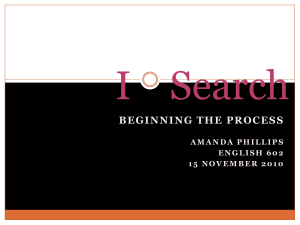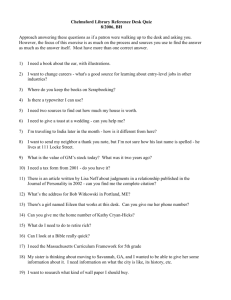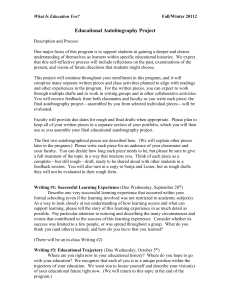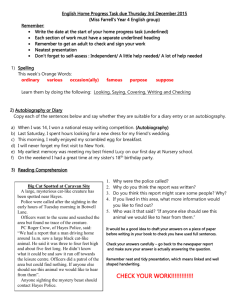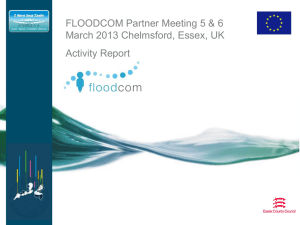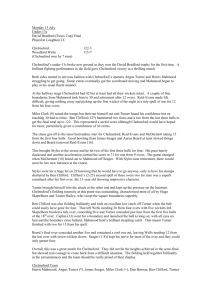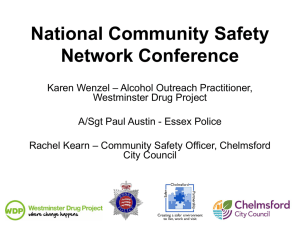Biography of John Wattles revised
advertisement
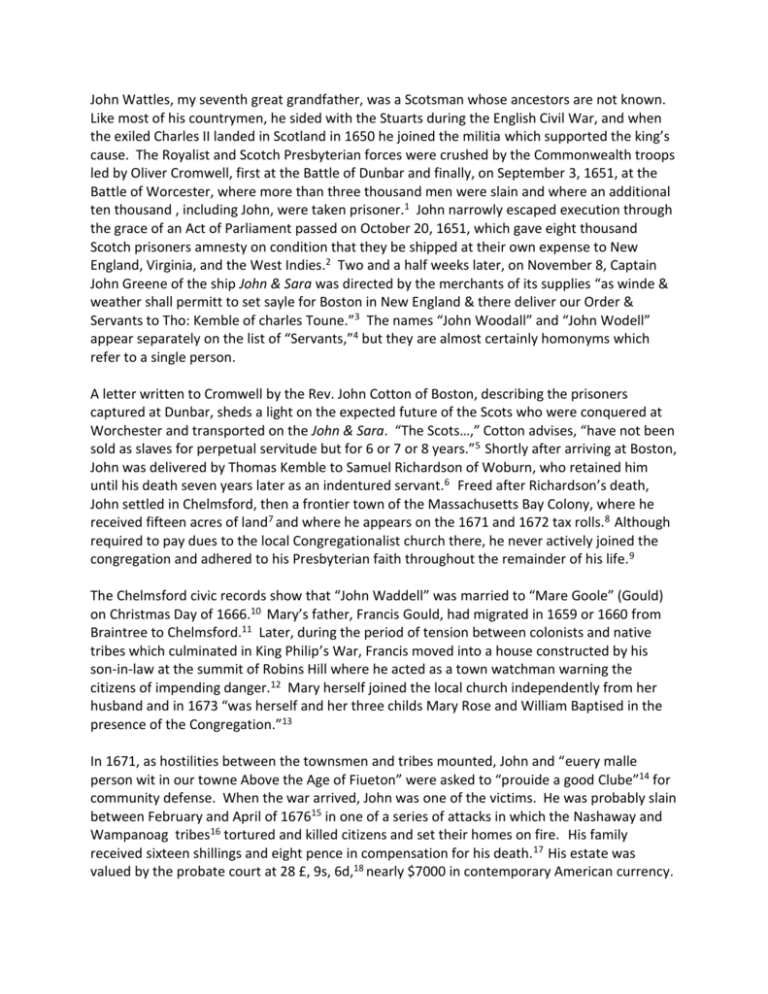
John Wattles, my seventh great grandfather, was a Scotsman whose ancestors are not known. Like most of his countrymen, he sided with the Stuarts during the English Civil War, and when the exiled Charles II landed in Scotland in 1650 he joined the militia which supported the king’s cause. The Royalist and Scotch Presbyterian forces were crushed by the Commonwealth troops led by Oliver Cromwell, first at the Battle of Dunbar and finally, on September 3, 1651, at the Battle of Worcester, where more than three thousand men were slain and where an additional ten thousand , including John, were taken prisoner.1 John narrowly escaped execution through the grace of an Act of Parliament passed on October 20, 1651, which gave eight thousand Scotch prisoners amnesty on condition that they be shipped at their own expense to New England, Virginia, and the West Indies.2 Two and a half weeks later, on November 8, Captain John Greene of the ship John & Sara was directed by the merchants of its supplies “as winde & weather shall permitt to set sayle for Boston in New England & there deliver our Order & Servants to Tho: Kemble of charles Toune.”3 The names “John Woodall” and “John Wodell” appear separately on the list of “Servants,”4 but they are almost certainly homonyms which refer to a single person. A letter written to Cromwell by the Rev. John Cotton of Boston, describing the prisoners captured at Dunbar, sheds a light on the expected future of the Scots who were conquered at Worchester and transported on the John & Sara. “The Scots…,” Cotton advises, “have not been sold as slaves for perpetual servitude but for 6 or 7 or 8 years.”5 Shortly after arriving at Boston, John was delivered by Thomas Kemble to Samuel Richardson of Woburn, who retained him until his death seven years later as an indentured servant.6 Freed after Richardson’s death, John settled in Chelmsford, then a frontier town of the Massachusetts Bay Colony, where he received fifteen acres of land7 and where he appears on the 1671 and 1672 tax rolls.8 Although required to pay dues to the local Congregationalist church there, he never actively joined the congregation and adhered to his Presbyterian faith throughout the remainder of his life. 9 The Chelmsford civic records show that “John Waddell” was married to “Mare Goole” (Gould) on Christmas Day of 1666.10 Mary’s father, Francis Gould, had migrated in 1659 or 1660 from Braintree to Chelmsford.11 Later, during the period of tension between colonists and native tribes which culminated in King Philip’s War, Francis moved into a house constructed by his son-in-law at the summit of Robins Hill where he acted as a town watchman warning the citizens of impending danger.12 Mary herself joined the local church independently from her husband and in 1673 “was herself and her three childs Mary Rose and William Baptised in the presence of the Congregation.”13 In 1671, as hostilities between the townsmen and tribes mounted, John and “euery malle person wit in our towne Above the Age of Fiueton” were asked to “prouide a good Clube”14 for community defense. When the war arrived, John was one of the victims. He was probably slain between February and April of 167615 in one of a series of attacks in which the Nashaway and Wampanoag tribes16 tortured and killed citizens and set their homes on fire. His family received sixteen shillings and eight pence in compensation for his death.17 His estate was valued by the probate court at 28 £, 9s, 6d,18 nearly $7000 in contemporary American currency. -2Mary, who with her parents survived the onslaught, fled with her children to the relatively secure town of Dorchester near Boston Harbor.19 John’s more immediate descendants in my lineage married into families which played a significant role in colonial history. Abigail, the wife of his son William, was the daughter of Samuel Belcher, the original owner of the house, now owned by the National Park Service, where the future president John Adams and his bride Abigail Adams lived and where John Quincy Adams was born. John’s grandson, Captain John Wattles, married Judith Fitch, a descendant of (1) the Rev. James Fitch, the traditional founder of Lebanon, Connecticut, (2) Major John Mason, Deputy Governor of Connecticut Colony, once renowned and now notorious for conducting the near-extermination of the Pequot Tribe, and (3) the Rev. Robert Peck, a nonconformist gadfly during the reigns of James I and Charles I and the inspirational leader of the Puritan emigrants who established Hingham, Massachusetts. John’s great and great great grandsons Mason and Daniel Wattles served in combat during the French and Indian and Revolutionary Wars. John is officially registered as a Founder and Patriot of America.20 He was clearly a man of enormous courage and integrity and I feel honored to claim him as an ancestor. 1 Trevor Royal, Civil War: The Wars of the Three Kingdoms 1638-1660 (London: Abacus, 2006), 602. 2 Gurdon Wallace Wattles, Autobiography of Gurdon Wallace Wattles (New York: Scribner, 1922), 191. 3 John Beex, Robert Rich, and William Greene, qtd. in Autobiography, 189. 4 Charles E. Banks, Scotch Prisoners Deported to New England by Cromwell, 1651-1652 (Massachusetts Historical Society Proceedings, Vol. 61 [October 1928]), 4-29. 5 Qtd. in Autobiography, 190. 6 Zona Smith, Genealogy of Augustus Wattles (Fort Wayne IN: Allen County Public Library Foundation, n.d.), 107. 7 Autobiography, 192. 8 Wilson Waters, Rev., and Henry Spaulding Perham, History of Chelmsford, Massachusetts (Lowell MA: Courier Citizen, 1917), 59-60 9 Autobiography, 193. 10 Vital Records of Chelmsford, Massachusetts, to the End of the Year 1849 (Salem MA: Essex Institute, 1914), 340. 11 Mark Sumner Still, The Genealogy of the Gould Family, Containing a record of one line of descendants of Francis Goole of Braintree and Chelmsford, Mass. (Whittier CA: Mark S. Still, 1971), 1. -312 History of Chelmsford, 63-64. Fiske, John, Rev., qtd. in Autobiography, 193. 14 Samuel Adams, Town Clerk, qtd. in Autobiography, 194. 15 Autobiography, 194. 16 Russell Bourne, The Red King’s Rebellion: Racial Politics in New England 1675-1678 (New York: Atheneum, 1990), 177. 17 History of Chelmsford, 121. 18 Autobiography, 195. 19 Autobiography, 195. 20 National Society of Daughters of Founders and Patriots of America, Founders and Patriots of America Index (Baltimore: Genealogical Publishing Co., 1993), 238. 13

